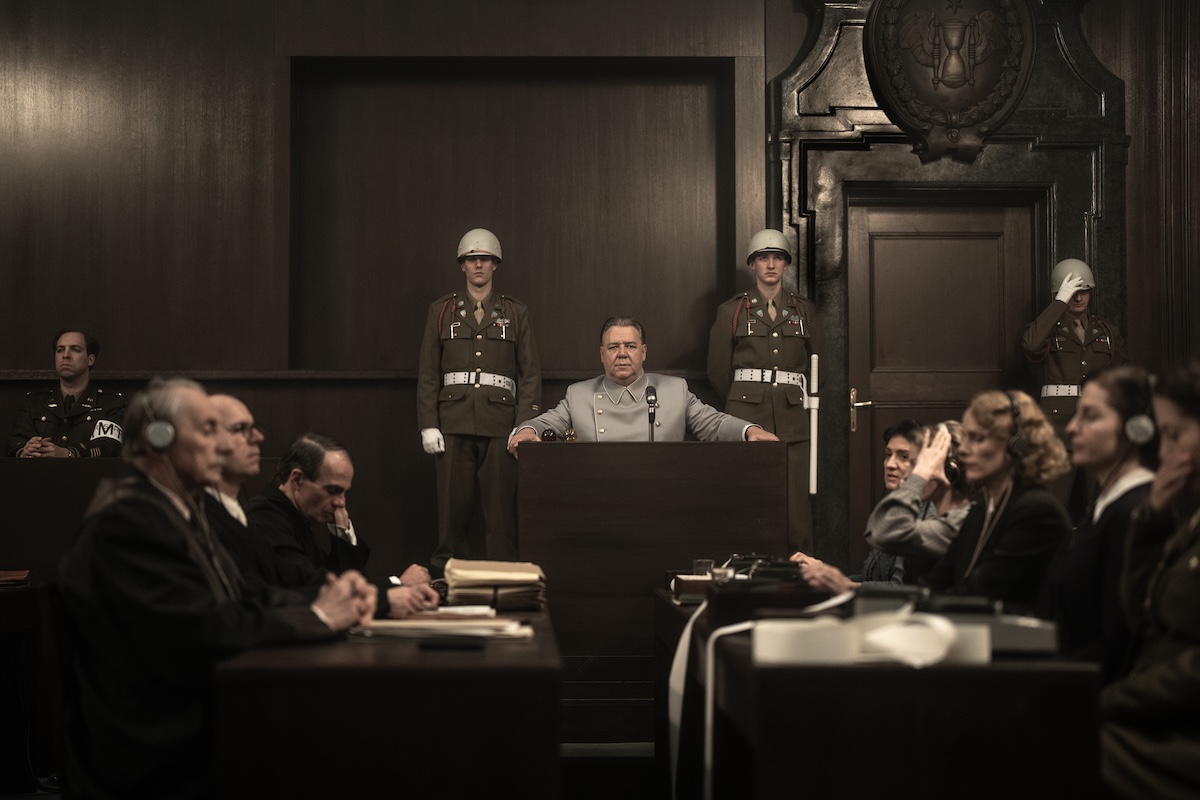James Vanderbilt’s Nuremberg is a grand, complex, thought-provoking, intelligent piece of work, a combination war movie/courtroom drama/political beacon, on a subject that most of its audience might think is over and done with.
All the action takes place in 1945-46, in the aftermath of World War II in Europe. The key setting is a previously bomb-damaged courtroom in Nuremberg, Germany, where an international military tribunal of four judges from the Allied powers—one each from the U.S., Great Britain, the Soviet Union and France—meet to decide the fate of 24 Germans, essentially the top surviving political, military and economic leaders of the Third Reich (Adolf Hitler, Joseph Goebbels and Heinrich Himmler are already dead by suicide).
As director-co-writer Vanderbilt—adapting a book by journalist Jack El-Hai—sets up the story, the top dog among the vanquished Nazis is Hermann Göring (played by Russell Crowe), commander of the Luftwaffe. Putatively second in line after Hitler, Göring was captured alive by American troops in Austria in May, 1945.
Like most of the defendants, Göring is unrepentant, defiant, even arrogant toward the court. That stance poses a strategic challenge to the lead American prosecutor, Robert H. Jackson (Michael Shannon), a U.S. Supreme Court justice. Jackson seeks to establish a legal basis for charging the Nazis in this unprecedented—that word, so familiar to stateside viewers in 2025—criminal case.
With help from Dr. Douglas Kelley (Rami Malek), a U.S. Army psychiatrist brought in to chat up (read: headshrink) Göring and prevent suicides, Jackson and the other Allied prosecutors are able to charge the original Nazi—Göring was a Hitler comrade since the failed “Beer Hall Putsch” of 1923—with four offenses: crimes against peace, war crimes, crimes against humanity and conspiracy to commit.
Göring is as slippery as a bockwurst on a toothpick. A decorated ace flyer of biplanes in WWI, by 1945 he had become a fat, opiate-addicted subject of caricature, as well as a major looter of confiscated artworks. Nevertheless, the former importer and hunter of American raccoons to populate German forests (look it up) still thought of himself as too wily and strong to be convicted.
Göring’s bragging intrigues the inquisitive Dr. Kelley, and so does his explanation of Hitler’s appeal to the average German. “He made us feel German again,” enthuses the ex-Reichsmarschall – words to be modified years later by another “strong man” public figure, in another continent far away.
Australian actor Crowe has made a specialty of portraying flawed tough guys (L.A. Confidential, Gladiator, Les Misérables). His Göring is one of his best, and the role matches up well with Malek’s crafty psychiatrist. There are definite similarities between the Göring-Kelley relationship and the one between Hannibal Lecter and Clarice Starling in The Silence of the Lambs—questions of morality and ethics, and intellectual power versus low animal cunning.
Implicit in the subtext of Nuremberg is the rejection of the idea, sometimes voiced in our present day, that it’s better to deal with the crimes of a mad dictator and his rabid followers with more violence, rather than in a court of law. Some high-ranking Americans favored summary execution. Nothing doing, the law must prevail, declares Robert Jackson unequivocally. On the other hand, Kelly’s solution to the Göring problem is more psychological: “The trick is to use his vanity against him.”
Director Vanderbilt’s well-chosen cast works hand-in-hand with the authentic-looking settings. The film was shot in Budapest, Hungary and the U.S. The lead character actors resemble their historical subjects uncannily, with special kudos to Crowe, Malek, Shannon, Richard E. Grant (as British judge Sir David Maxwell Fyfe) and Dutch actor Lotte Verbeek as Göring’s thoroughly Nazi widow, Emmy.
It would be relatively easy to fashion a whodunnit about Nazi Germany’s many crimes. What’s more difficult, and more gratifying, is Nuremberg’s determination to make a “whydunnit” instead. So we have something to refer to other than explosions and atrocities. Murder will out.
* * *
In theaters






